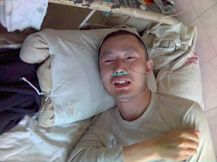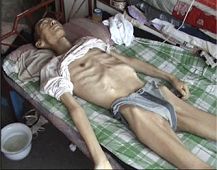Torture in Chaoyanggou Forced Labor Camp: Practitioner Mr. Wang Guoxiang Has a Stroke and Many Other Practitioners Die (Photos)
(Clearwisdom.net) Chaoyanggou Forced Labor Camp in Changchun City, Jilin Province, is responsible for the torture of many practitioners. Recently, practitioner Mr. Wang Guoxiang had a stroke due to torture and is now unable to take care of himself. This past March staff at the forced labor camp carried out an "Attack the Fort" campaign to torture Falun Gong practitioners who remained firm in their belief. Mr. Wang Guoxiang was not allowed to sleep for 15 days and was forced to sit on a "sitting board," an instrument of torture that requires the victim to sit in a fixed position and is beaten if he/she moves at all.
Mr. Wang Guoxiang had a stroke after being tortured at the Chaoyanggou Forced Labor Camp and can no longer take care of himself.
Mr. Wang Guoxiang, 38, was arrested when distributing truth-clarification materials in Changbai County in the Baishan Region, Jilin Province. He was sentenced to two years of forced labor. When he was taken to Chaoyanggou Forced Labor Camp in April 2005, he was assigned to the First Division. Because he refused to be "transformed," he was transferred to the Second Division during the "Attack the Fort" campaign, implemented to "transform" practitioners in May 2005. Guards Ma Yuntao and others repeatedly held "discussions" with him at night. They tortured him from nine or ten o'clock in the evening until two or three o'clock in the morning. They also assigned inmates as his personal cangues who monitored him around the clock. They would not let him go to the cafeteria.
Mr. Wang was transferred to the Fourth Division in November 2005. He was monitored by inmates around the clock. He was forced to sit daily on a plastic stool in the dormitory room all by himself. He was not allowed to talk to anyone. Another round of "Attack the Fort" campaign to forcibly "transform" practitioners was carried out in December 2005. Mr. Wang was forced to sit on a cold marble floor day-in and day-out. A few days later, he appeared to have difficulty walking on the way to the restroom. Beginning on March 1, 2006, the guards at the Fourth Division tortured him again. He was handcuffed to the bed frame with his arms stretched out for three or four days. Afterwards, two inmates monitored him closely and did not allow him to sleep for over twenty days.
People Responsible for Torturing Mr. Wang Guoxiang Were the Head of the Fourth Division Tao Qingxuan and Guard Chen Lihui
During these several "Attack the Fort" campaigns, the guards were heard shouting and verbally abusing the practitioners. The sound of electric batons and practitioners crying out in pain from the brutal torture could be heard from morning to evening. The guards beat practitioners into unconsciousness several times, put salt on their wounds, and poured freezing cold water over their bodies. They hung them up by their arms and legs so they could beat them. They beat them so severely that the practitioners were unable to eat any food. The guards also ordered inmates to torture practitioners. The Education Division called itself a "civilized division" and announced that they "never beat or tortured people," a total lie. Once newly arrested practitioners arrive, the inmates take them to the water room to be beaten. They also make the practitioners take a cold shower and then put them into a large room with a couple dozen people, lining up and sitting down. The inmates squeeze from either end. They squeeze the practitioners together so tightly they can't move. They close all the windows and do not allow the practitioners to take off their clothes. The practitioners sweat a lot and are required to stay still. Otherwise they will be beaten. Sometimes the guards take the practitioners to the guards' office where they beat them with rubber belts until they bleed, or beat them with electric batons until their flesh has burn marks. Four or five guards beat one practitioner in an effort to "transform" him/her. The managers of Chaoyanggou Forced Labor Camp once said, "We do not care whether the person is elderly, weak, or injured. As long as the practitioner is still alive, we will not release him. If he is about to die, we just put him outside our camp to let him die. The forced labor camp is not held responsible for these deaths."
Selected Information about Practitioners Tortured to Death at Chaoyanggou Forced Labor Camp
Practitioner Mr. Li Wanyun was tortured until he looked like a skeleton
Mr. Li Wanyun was born on September 8, 1962. He was very healthy and strong and worked as a warden at Xingye Prison in Changchun City, Jilin Province. He began to practice Falun Gong in October 1997. He earned many awards at work for his dedication and commitment to his job. In the spring of 2000, Mr. Li was arrested and sentenced to one year of forced labor for clarifying the truth. He was first imprisoned at Heizuizi Forced Labor Camp in Changchun City and later transferred to the infamous Fenjin Forced Labor Camp in Changchun City. The torture left him with festering wounds all over his body. He was not able to wear clothes. Mr. Li was released in November 2000. In 2002, he was sentenced to three years of forced labor again. He was brutally tortured by guards at Chaoyanggou Forced Labor Camp. He became extremely weak and developed osteomyelitis. He was given compassionate medical leave in June 2003 because of his critical health. Continued persecution by the evildoers of the Chinese Communist Party (CCP) and subsequent illness claimed his life on August 3, 2006.
Mr. Bai Xiaojun, 35, was a practitioner from Changchun City, Jilin Province. He was sentenced to one year of forced labor in July 2000 for going to Beijing to appeal for Falun Gong. In January 2002, after being imprisoned seven months beyond his term, he was taken to Chaoyanggou Forced Labor Camp for further illegal imprisonment. He was tortured to death on July 18, 2003.
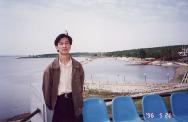
Practitioner Mr. Bai Xiaojun was tortured to death by the Fourth Division of Chaoyanggou Forced Labor Camp
Mr. Bai was illegally imprisoned at the Forth Division of Chaoyanggou Forced Labor Camp. Since early June 2003, he could not eat due to the brutal torture. He threw up everything he tried to eat. He asked the head of the Fourth Division, Fu Guohua, and other guards for noodles many times, but he was ignored. Only when he was in critical condition did the guards cook some noodles for him, but he was extremely skinny and weak by then, and he could no longer eat or drink water.
The Fourth Division was dissolved on June 30, 2003, because a practitioner escaped. Mr. Bai was then imprisoned at the First Squadron of the First Division. The First Division brought in a few people to care for him. When Mr. Bai was about to die on July 6, the guards from the First Division carried him out of the forced labor camp. He was never taken to a hospital for medical care, but the medical staff at the forced labor camp gave him some intravenous injections. Mr. Bai Xiaojun could not escape the evildoers' abusive yells.
Mr. Li Qiu, 41, a former employee of the Yongchun Post Office of the Changchun City Post Office, lived at Yongchun Town in a suburb of Changchun City. Mr. Li Qiu was arrested many times since 1999. On March 5, 2002, the Changchun City Nanguan District Court staged fake trials of arrested practitioners to lure more practitioners into their clutches. They hoped practitioners would come to the court so that they could arrest them. Mr. Li Qiu was arrested at the gate of the court. That was his fourth arrest. He was sent to Datun Forced Labor Camp in Changchun City. The guards there used many methods to torture him until he lost consciousness. He was then taken to the Police Hospital where he was tortured for two months. After that he was taken to Tiebei Prison in Changchun City. In July 2002, he was transferred to Chaoyanggou Forced Labor Camp. After being savagely tortured, he no longer could sit or lay down. His entire body was swollen and he could barely breathe. Afraid of having to accept responsibility, Chaoyanggou Forced Labor Camp told his family to take him home from the Sino-Japan Unit Hospital in Changchun City at ten o'clock one evening in January 2003. When he was at home, pus discharged from his chest and back and his legs were paralyzed. He was not able to care for himself and died on July 6, 2004.
Mr. Liu Ziwei, 29, was a practitioner at Hunjiang City in Jilin Province. He held a hunger strike for six days at the police station before he was taken to Chaoyanggou Forced Labor Camp on December 20, 2004. He was extremely week on arrival at the forced labor camp. He continued his hunger strike at the labor camp. The guards tortured him by putting him in solitary confinement, force-feeding him, and cuffing both hands to the wall. His wrists bled. He was handcuffed for several days and not allowed to sleep. The guards stuffed socks into his mouth to stop him from shouting. At around 11 p.m. on December 13, 2004, when he was in critical condition, the guards took him to a hospital. Mr. Liu died on the way to the hospital. The guards removed the handcuff rings from the wall to destroy the evidence.
Mr. Song Wenhua, 56, was an employee of the Tonghua City Railroad Bureau in Jilin Province. He was arrested by government officials of Hulutao Township in Tonghua City when he was clarifying the truth in 2003. He was imprisoned at Chaoyanggou Forced Labor Camp. On October 8, 2004, the forced labor camp released him because he was in critical condition and they thought that they could not save him. Mr. Song Wenhua died on the evening of October 17, 2004.
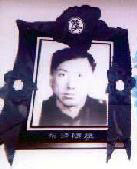
Practitioner Song Wenhua died of the persecution
According to reliable sources at Chaoyanggou Forced Labor Camp, Mr. Song came down with health problems in March 2004. Staff at the forced labor camp examined him three or four times and he was diagnosed with uberculosis and other illnesses. More critically, one side of his chest had developed pleural effusion with 80 percent water in it. In June 2004, the forced labor camp informed Mr. Song's family that he had open tuberculosis and allowed him compassionate medical leave. However, the forced labor camp delayed releasing him for two more months. When his family asked about him, labor camp officials told them that the Jilin Province Judicial Bureau did not approve his release. His family went to the Judicial Bureau. Section Chief Zhang of the Judicial Bureau said, "We do not release people easily. He will be released only if he is close to death. The Judicial Bureau will take responsibility if he has any problems."
During the two-month delay, Mr. Song's family were not allowed to visit him. During that time, though extremely weak, he was still forced to do intensive labor just like other healthy inmates. The guards also kept asking him, "What's the relationship between you and the person who went with your children to the Jilin Province Judicial Bureau for your release?"
Later, Mr. Song had a high fever above 102 degrees Fahrenheit for more than ten days and was not able to eat for four or five days. He could not see or hear clearly. Staff at the forced labor camp did not report his situation, nor did they provide any medical treatment. When his family members saw him again, he was no longer able to take care of himself. He could no longer talk and was only skin and bones. A 56-year-old person looked like a man in his 70s. Mr. Song was released on October 8, 2004. He died a few days later.
Mr. Zhang Qifa, 38, was an employee of the Sanchazi Forest Farm of the Jiangyuan County Forestry Bureau in Baishan City, Jilin Province. He was illegally sentenced to one year of forced labor and re-education in March 2002 and imprisoned at Chaoyanggou Forced Labor Camp. He died on January 19, 2003, as the result of torture.
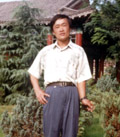
Practitioner Mr. Zhang Qifa died the day after he was released.
Mr. Zhang was released after his first arrest on February 19, 2002. Only fourteen days after he returned home, on March 6, 2002, he was taken by police to Chaoyanggou Forced Labor Camp for one year of forced labor. Guards Zhao Dongli and Shu Shenglin from the Second Division beat him viciously with belts and continuously tortured him with other methods for three days. They dragged him out to the guards' room for torture. The sound of beating, the sizzling of the electric baton, and cries of great pain could be clearly heard. When they were tired, they would drag him back to his room. Then they would again torture him. After the severe beating, there was no skin left on Mr. Zhan. He was in critical condition. When he was released on January 18, 2003, his body was full of scars, and his skin was black and covered with many wounds. His legs were in such a great pain that he could not walk. He had difficulty breathing, speaking, and excreting. He died on January 19, 2003.
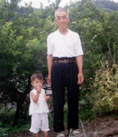
Practitioner Mr. Zhang Quanfu and his granddaughter Zhang Qi
Mr. Zhang Quanfu, 65, was the father of Mr. Zhang Qifa. He was also an employee of the Sanchazi Forest Farm of the Jiangyuan County Forestry Bureau in Baishan City, Jilin Province. He was tortured to death by the guards from the Second Squadron of the Sixth Division of Chaoyangguo Forced Labor Camp.
Beginning in November 2002, Chaoyanggou Forced Labor Camp carried out a "One Hundred Day Campaign to Attack the Fort," which meant the persecution of Falun Dafa practitioners. Before this round of torture, Mr. Zhang Quanfu had already been tortured and was injured all over his body. His pants were always wet because of the pus draining from his wounds. He weighed less than 66 pounds. He ate very little and was in critical condition. Instead of releasing him, the forced labor camp escalated the torture. They extended the time he had to sit without moving on a board from five in the morning to midnight.
When Mr. Zhang Quanfu was called into the guards' room, Guard Wang Tao asked him whether he would continue practicing Falun Gong. Mr. Zhang Quanfu said, "I will cultivate Dafa as long as I can breathe." Wang Tao grabbed a large cup of boiling water and poured it over his hands. The skin on his hands was burned and blistered immediately.
After this torture, Mr. Zhang Quanfu got worse and worse. His hands were infected. He could not eat or drink. The squadron lead guard, Li Zhongbo, said he was just pretending and asked two personal cangues to carry him to the cafeteria daily. Mr. Zhang Quanfu was forced to sit on the board the day before he died. The guards saw that he was about to die and sent him to hospital, but it was too late and he died that evening.
Mr. Liang Baisheng, 48, worked at the Jingyuetan Economic Development and Tourism District in Changchun City. He was illegally taken to a forced labor camp for a two-year term on September 20, 1999. The guards at the forced labor camp extended his term for another two months. He was released on November 20, 2001. In March 2002, police from the Yutan Town Police Station arrested him and took him to the Changchun City Police Department. There, he was beaten brutally and tortured on the "Tiger Chair" and with other torture instruments. Then he was imprisoned at Chaoyanggou Forced Labor Camp for two years. The guards ordered inmates to beat him with wooden sticks. They took off his clothes off and pushed him into the bathroom and used high pressure water hoses on him. He was extremely cold and became unconscious from the freezing cold water. When he came to, the inmates forced him to sit on the concrete floor and did not allow him to sleep. He suffered from high fever continuously, but he was still forced to work at the factory during the day. He was tortured like this five times within a week. Then he came down with high fever and could not eat. He kept coughing and spitting blood. Mr. Liang developed pulmonary tuberculosis and died on March 20, 2006.
Chaoyanggou Forced Labor Camp used these kinds of vicious methods to torture many practitioners to death during the past several years. In addition to the above mentioned practitioners, several other practitioners developed pulmonary tuberculosis from the torture and were released but died afterwards. They were: Mr. Zheng Yongguang from Changchun City, who died a year after being released; Mr. Zheng Yongping from Baishan City in Jilin Province died twenty days after being released; Mr. Li Chuanwen from Hongmei Town in Meihekou City, Jilin Province, died nine days after being released; and Mr. Zheng Fuxiang from Yushu City in Jilin Province died the day after being released.
September 14, 2006
